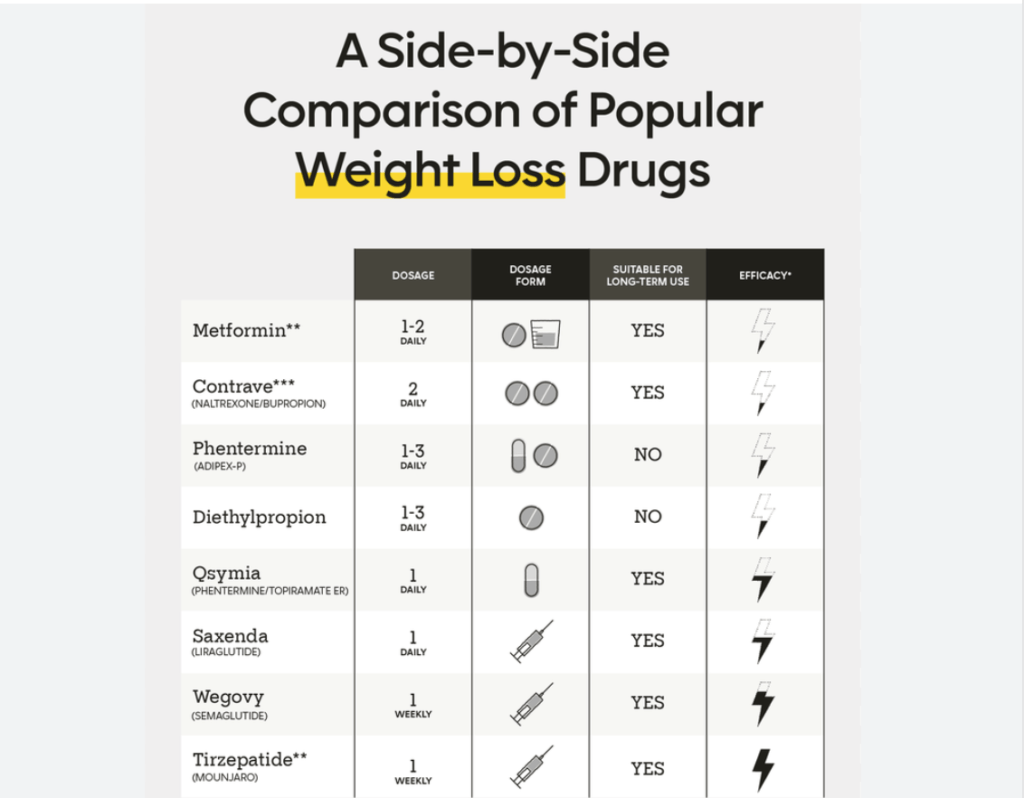
IntroductionIn a world where the pursuit of a healthy lifestyle is more crucial than ever, weight loss remains a significant challenge for many individuals. While the market is flooded with...
Introduction
In a world where the pursuit of a healthy lifestyle is more crucial than ever, weight loss remains a significant challenge for many individuals. While the market is flooded with various diets, supplements, and fitness programs promising quick results, the effectiveness and safety of these approaches can be questionable. Consulting a doctor for weight loss medication, however, offers a more reliable and personalized solution. In this blog post, we will delve into the realm of weight loss medications, highlighting the importance of personalized weight loss plans monitored by healthcare professionals and underscoring the superiority of personalized plans over generalized weight loss approaches.
Understanding Weight Loss Medications
Weight loss medications, when prescribed and monitored by healthcare professionals, can be valuable tools in the battle against obesity. These medications work in different ways, such as suppressing appetite, blocking fat absorption, or increasing metabolism. It's important to note that these medications are not a one-size-fits-all solution, and their efficacy varies from person to person.
Types of Weight Loss Medications: The Rise of GLP-1 Agonists

In recent years, the landscape of weight loss medications has expanded, and one notable class gaining prominence is GLP-1 agonists. Glucagon-like peptide-1 (GLP-1) is a hormone that plays a crucial role in regulating appetite and glucose metabolism. Medications in this class were initially developed for managing type 2 diabetes but have shown remarkable efficacy in promoting weight loss as well.
GLP-1 medications work by mimicking the effects of the natural GLP-1 hormone, which helps control blood sugar levels and induces a feeling of fullness. This dual action makes them particularly promising for individuals struggling with obesity. Not only do they aid in weight loss, but they also contribute to improved glucose control, making them a valuable option for those with comorbid conditions.
What sets GLP-1 agonists apart is their ability to target specific receptors in the brain that regulate appetite and food intake. By modulating these pathways, GLP-1 medications address the root causes of overeating and weight gain. Moreover, they have shown a consistent track record of safety and tolerability.
The Importance of Personalization
Personalization in weight loss plans is paramount for several reasons. Firstly, everyone's body reacts differently to medications and lifestyle changes. What works for one person may not work for another. A personalized approach takes into account individual factors such as metabolism, genetics, and underlying health conditions, leading to a more targeted and effective weight loss strategy.
Secondly, a personalized plan addresses the root causes of weight gain. Rather than focusing solely on calorie restriction or generic exercise routines, doctors can identify and address specific issues contributing to weight gain, such as hormonal imbalances or medical conditions. This targeted approach increases the likelihood of long-term success.
Superiority of Personalized Plans Over Generalized Approaches
Generic weight loss approaches often rely on one-size-fits-all solutions, advocating for the same dietary restrictions and exercise routines for everyone. However, these approaches fail to recognize the uniqueness of each individual's body and lifestyle. Personalized plans, on the other hand, consider the nuances of an individual's health, making them inherently superior.
Moreover, generic approaches may not account for potential health risks or contraindications specific to certain individuals. Without the guidance of a healthcare professional, individuals may unknowingly put their health at risk by following generalized advice that doesn't consider their unique medical history.
Book Your Appointment Today at LifeRx.md
If you’re ready to take control of your weight and embark on a successful weight loss journey, LifeRx.md is here to support you. Our team of experienced doctors and healthcare professionals is dedicated to helping you achieve your weight loss goals through personalized nutrition, weight loss medications, and ongoing support.
Visit our website today to learn more about our services and book your appointment. Take that important first step towards a healthier lifestyle and let us guide you towards a happier and more confident you. We look forward to being a part of your weight loss journey at LifeRx.md!
Conclusion
In the quest for effective and safe weight loss, consulting a doctor for weight loss medication emerges as the best choice. Personalized weight loss plans, monitored by healthcare professionals, offer a tailored approach that addresses individual needs and challenges. The superiority of personalized plans over generic approaches lies in their ability to consider the uniqueness of each person's body and health profile. By prioritizing personalized care, individuals can embark on a weight loss journey that is not only effective but also sustainable in the long run.